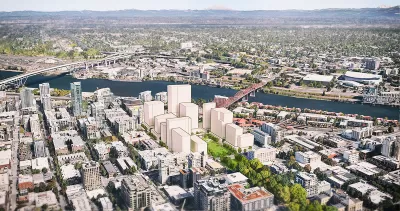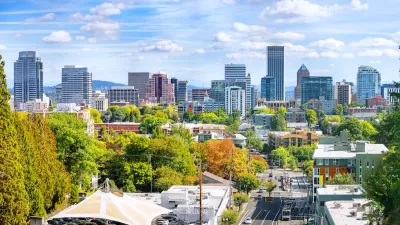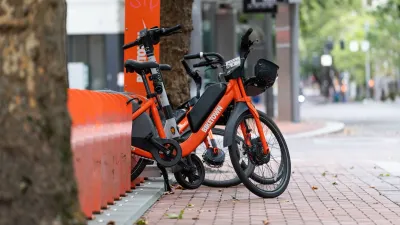The Broadway Corridor CBA is designed to create high quality jobs, housing, and opportunities for historically excluded communities.

A 32-acre redevelopment project in Portland will be subject to "an unprecedented community benefits agreement (CBA)" that "prioritizes racial equity, delivering good jobs, and benefiting working class residents," writes Meg Walker. "Despite the city’s efforts over the past 30 years to address racial disparities through planning, rezoning, and fair housing policies, many residents continue to feel left out of the development process and priced out of new neighborhoods." A group of more than 20 local organizations, which came together to found the Healthy Communities Coalition (HCC) in 2015, has been working to "ensure new development projects delivered jobs, quality housing, and other opportunities for the people they represented."
"For over 20 years, CBAs have provided low-income communities with the means to obtain living wages, local hiring commitments, and other community economic benefits from developers of large-scale projects. In addition to the broad representation of underserved communities from Portland and a commitment to racial equity, what makes the Broadway Corridor CBA different from most is that it is not a 'public works' project built solely with major public subsidies, but instead a public-private partnership funded primarily through private investment."
The agreement calls for "the creation of 8,800 new jobs prioritizing people of color and women (30% people of color and 15% women), the provision of workforce development funds in the construction and operation phases, and stipulations that affordable housing will comprise approximately 30% of the total units," as well as a commitment to providing grants and low-cost loan to small businesses and carbon reduction and other sustainability goals.
"While the CBA for this immense public-private project will likely face many challenges in the future (and many residents believe it could have gone further in its scope), this once-in-a-generation opportunity is still raising the bar for equitable and sustainable development."
FULL STORY: How a diverse coalition in Portland, Ore. is centering racial equity in a large-scale development project

Planetizen Federal Action Tracker
A weekly monitor of how Trump’s orders and actions are impacting planners and planning in America.

San Francisco's School District Spent $105M To Build Affordable Housing for Teachers — And That's Just the Beginning
SFUSD joins a growing list of school districts using their land holdings to address housing affordability challenges faced by their own employees.

The Tiny, Adorable $7,000 Car Turning Japan Onto EVs
The single seat Mibot charges from a regular plug as quickly as an iPad, and is about half the price of an average EV.

Seattle's Plan for Adopting Driverless Cars
Equity, safety, accessibility and affordability are front of mind as the city prepares for robotaxis and other autonomous vehicles.

As Trump Phases Out FEMA, Is It Time to Flee the Floodplains?
With less federal funding available for disaster relief efforts, the need to relocate at-risk communities is more urgent than ever.

With Protected Lanes, 460% More People Commute by Bike
For those needing more ammo, more data proving what we already knew is here.
Urban Design for Planners 1: Software Tools
This six-course series explores essential urban design concepts using open source software and equips planners with the tools they need to participate fully in the urban design process.
Planning for Universal Design
Learn the tools for implementing Universal Design in planning regulations.
Smith Gee Studio
City of Charlotte
City of Camden Redevelopment Agency
City of Astoria
Transportation Research & Education Center (TREC) at Portland State University
US High Speed Rail Association
City of Camden Redevelopment Agency
Municipality of Princeton (NJ)





























